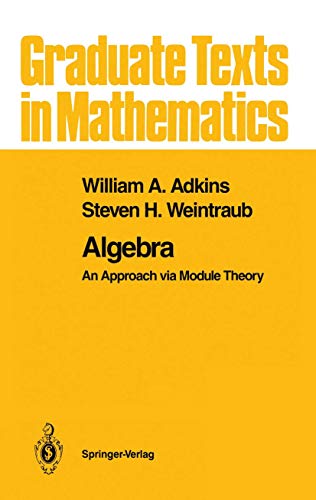Verwandte Artikel zu Algebra: An Approach via Module Theory: 136 (Graduate...

Zu dieser ISBN ist aktuell kein Angebot verfügbar.
Alle Exemplare der Ausgabe mit dieser ISBN anzeigen:Die Inhaltsangabe kann sich auf eine andere Ausgabe dieses Titels beziehen.
„Über diesen Titel“ kann sich auf eine andere Ausgabe dieses Titels beziehen.
- VerlagSpringer
- Erscheinungsdatum1999
- ISBN 10 0387978399
- ISBN 13 9780387978390
- EinbandTapa dura
- Anzahl der Seiten544
Neu kaufen
Mehr zu diesem Angebot erfahren
Versand:
EUR 32,99
Von Deutschland nach USA
Beste Suchergebnisse beim ZVAB
Algebra : An Approach via Module Theory
Buchbeschreibung Buch. Zustand: Neu. Druck auf Anfrage Neuware - Printed after ordering - This book is designed as a text for a first-year graduate algebra course. As necessary background we would consider a good undergraduate linear algebra course. An undergraduate abstract algebra course, while helpful, is not necessary (and so an adventurous undergraduate might learn some algebra from this book). Perhaps the principal distinguishing feature of this book is its point of view. Many textbooks tend to be encyclopedic. We have tried to write one that is thematic, with a consistent point of view. The theme, as indicated by our title, is that of modules (though our intention has not been to write a textbook purely on module theory). We begin with some group and ring theory, to set the stage, and then, in the heart of the book, develop module theory. Having developed it, we present some of its applications: canonical forms for linear transformations, bilinear forms, and group representations. Why modules The answer is that they are a basic unifying concept in mathematics. The reader is probably already familiar with the basic role that vector spaces play in mathematics, and modules are a generaliza tion of vector spaces. (To be precise, modules are to rings as vector spaces are to fields. Artikel-Nr. 9780387978390
Weitere Informationen zu diesem Verkäufer | Verkäufer kontaktieren

